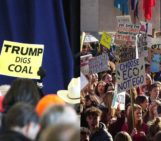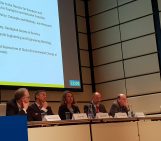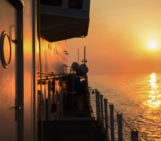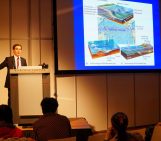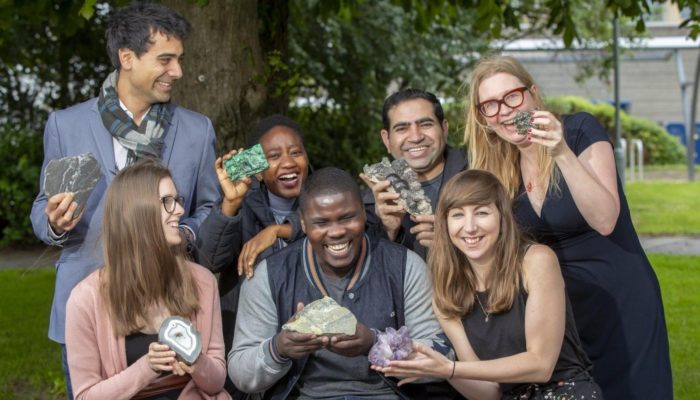
How can we source and use Earth resources in an ethical and responsible way? And how can we bring different actors and communities together to achieve sustainable resource development? These are just some of the questions that early career researchers from around the world came together to discuss during the inaugural Researching Social Theories, Resources, and the Environment International Summer School, held at the University College Dublin last month. In this blog post, Anthea Lacchia, a postdoctoral researcher at the Irish Centre for Research in Applied Geosciences, and Jen Roberts, a Chancellor’s Fellow in Energy at the University of Strathclyde, share their experience reporting on this summer school.
On the first week of July 2019, we were lucky enough to be part of a very special gathering of geoscientists and social scientists from developed and developing countries at University College Dublin (UCD), Ireland. The occasion that brought them all together was the inaugural Researching Social Theories, Resources, and Environment (ReSToRE) International Summer School.
The goal of the ReSToRE summer school was to enable critical cross-disciplinary discussions around the sustainable sourcing and use of Earth resources now and in the future. Big topic, right? And certainly one that can only be tackled by bringing together different perspectives, as became apparent during the week.
Organised by iCRAG, the Irish Centre for Research in Applied Geosciences, the summer school included 42 early career researchers and recent graduates from 28 nations including 18 developing countries.
“Moving forward for sustainable development is very complicated,” said Murray Hitzman, Director of iCRAG. “Not only are there technical challenges in terms of Earth resources and energy, but in terms of how people actually perceive both sustainable development and those challenges is even more critical.”
“This summer school is trying to help with this not just in one society, but in multiple societies, and to get those societies to understand one another as well, which is also a huge challenge,” he noted.
The summer school succeeded in creating a stimulating setting for interdisciplinary collaboration, knowledge sharing and network-building. During the week, participants discussed emerging themes pertinent to the future of resourcing and consumption of Earth materials, such as: what drives societal attitudes toward the extraction industry? How can communities have their say in if and how resources near to them are developed? What are the barriers to a circular economy in the resources sector? How can Earth materials be resources in an ethical and responsible way?
Participants took the lead in deliberating these big questions. They were aided by guidance from expert mentors, as well as plenary talks and discussions. The conversations naturally spilled from the workshops into the social events, which included a fieldtrip to Glendalough, Co. Wicklow, Ireland, the site of an ancient lead, zinc and silver mine, and now a spectacular glacial valley.
And Summer put on a fine performance for the week, allowing the participants to move outside and seek inspiration amongst the fresh air, daisies and curious ducks.
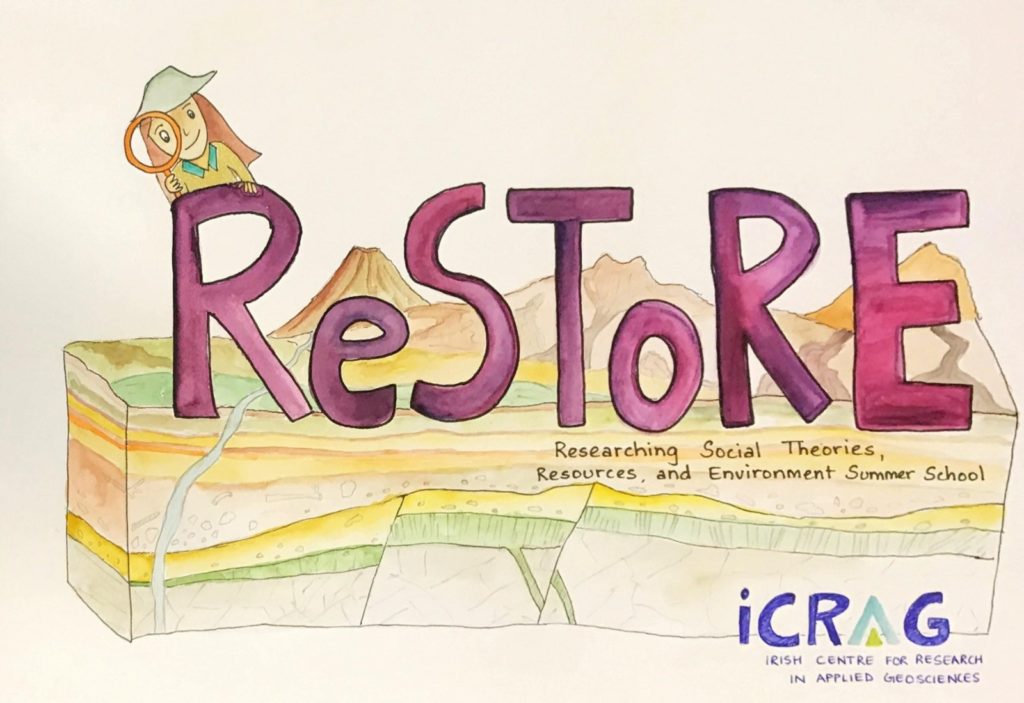
ReSToRE painting by summer school participant and artist, Meenakshi Poti (joint PhD student at Université Libre de Bruxelles and Vrije Universiteit Brussel, Belgium).
“Deposits of the metals that we need are irregularly distributed across the globe, and their value must be assessed with respect to sustainable development, alleviation of poverty and empowering of communities,” said International Union of Geological Sciences (IUGS) Councillor, Edmund Nickless, at the opening session of the summer school.
“This course is asking the right questions at the right time and the mix of social scientists and geoscientists and environmental scientists together is a triangle we really need,” added Ozlem Adiyaman Lopes from UNESCO’s Earth and Ecological Sciences division, who was able to join the summer school for several days.
Amongst participants and expert mentors 33 different nationalities were represented, including from Afghanistan, Australia, Bangladesh, Belgium, Botswana, Canada, Chile, Colombia, Congo (DR), Croatia, Ethiopia, Finland, Germany, Hungary, India, Ireland, Italy, Kenya, Lithuania, Mozambique, Namibia, Netherlands, Papua New Guinea, Russia, Sierra Leone, South Africa, Sweden, Switzerland, Tanzania, Turkey, UK, USA, and Zimbabwe. What an incredible forum!
Some reflections on the way ahead
Some key themes emerged from the conversations amongst the participants, expert mentors and organisers during the week. Firstly, the different actors necessary for resourcing a sustainable future cannot be considered in isolation. Consumer demand, business practices, environmental and societal impacts, community involvement in decision-making and development are all intrinsically interlinked in a non-linear chain which interweaves resource supply use and reuse.
Future resource development in line with global sustainability goals will require interplay between the technical and non-technical worlds, bridging policy, industry, practitioners and academia, and uniting geoscience and engineering, and social and political science, as well as local communities.
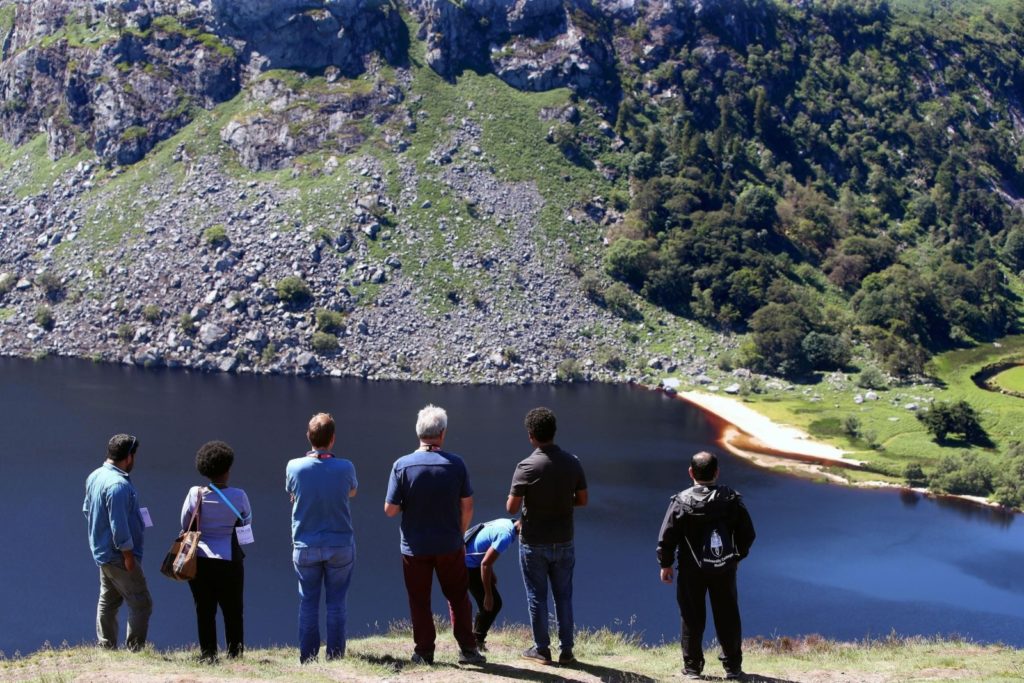
Summer school participants admiring the Irish landscape during the ReSToRE fieldtrip, Sally Gap, Co. Wicklow.
The circular economy, which aims to extract the most value out of resources and materials whilst in use, can act as a useful model for the resource sector: wherever one is placed along the supply chain from producer to consumer, we should all be supporting ways of producing resources cleanly and efficiently, with reduced, managed and – where possible – reused waste. And the management of mining waste has had increased profile in the past few years, with several tragic and preventable collapses of tailings dams which have had major societal and environmental consequences.
Our role
As reporters of the ReSToRE summer school, our role was to take note of the event and support the delivery of key outcomes. This meant that we were very busy capturing thoughts from participants, organisers, speakers and mentors through interviews, soaking in the atmosphere at the various social events and workshops, and carving out occasional moments to sit down by the lake at UCD and reflect on the week and how it was going. We relied on a trusted voice recorder and notebook, and quickly became acutely acquainted with the opening hours of cafés around campus. The participants’ WhatsApp group also proved incredibly useful for gaging how participants were feeling, as well as asking people to gather round for a photo, check a nationality or give advice on the best sights in Dublin, or pubs showing the Women’s World Cup.
More importantly, the summer school provided opportunity to create a diverse, international network of like-minded individuals working in the interdisciplinary sphere, as well as enabling everyone involved, including participants, mentors, organisers and ourselves to learn, reflect, and to create potential new avenues for research and collaboration.
One of the highlights has to be the mix of nationalities and cultures represented, as well as a general spirit of openness to new ideas and perspectives. Although the week was intense and the workshop participants were tasked with preparing presentations of their findings for the final day, the support and lack of competition amongst participants was palpable, and paved the way for creativity to emerge. Together, they created a safe space in which to be open, reflective, responsive and curious, and to bravely tackle some very complex questions.
We hope to continue these conversations at the interface of societal issues and geoscience at future conferences, such as the EGU General Assembly 2020. We hope you are inspired to join in. See you there!
By Anthea Lacchia (Irish Centre for Research in Applied Geosciences at University College Dublin) and Jen Roberts (University of Strathclyde)
Find out more
A suite of summer school resources, including live-streamed videos of the presentations and discussions by experts in the field and blogs from the delegates, can be found on the ReSTORE webpage: https://www.icrag-centre.org/restore/
iCRAG, the International Union of Geological Sciences and Geological Survey Ireland were the organising sponsors of ReSToRE, which was run under the patronage of UNESCO.
Sponsorship also came from BHP, Boliden, Rio Tinto, Teck, with additional support received from Irish Research Council and UCD College of Business.
About the authors
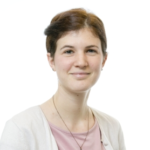 Anthea grew up in northern Italy, in a town at the foot of the Alps. Having studied Classics in high school in Italy, she moved to Ireland and obtained a BA in Geology from Trinity College Dublin. During her undergraduate studies, she developed a keen interest in thinking about the lives of ancient animals preserved in rocks – fossils – which led her to pursue a PhD in palaeontology, specifically looking at extinct relatives of squid and cuttlefish called ammonoids. She spent many seasons of fieldwork perusing the rocks of Co. Clare, in western Ireland. In parallel with her research, she gained experience both in science writing and newspaper editing. Following completion of her PhD, she spent a year working as a press officer for Springer Nature in London. She then returned to Ireland to start postdoctoral research in iCRAG, the Irish Centre for Research in Applied Geosciences, in University College Dublin, where she is studying public perception and understanding of geosciences, with a focus on the geology and communities of Co. Clare. Her postdoc allows her to combine her passion for geology with that for science communication and public engagement. Anthea also works as a freelance science writer. Anthea took part in the ReSToRE Summer School as a reporter.
Anthea grew up in northern Italy, in a town at the foot of the Alps. Having studied Classics in high school in Italy, she moved to Ireland and obtained a BA in Geology from Trinity College Dublin. During her undergraduate studies, she developed a keen interest in thinking about the lives of ancient animals preserved in rocks – fossils – which led her to pursue a PhD in palaeontology, specifically looking at extinct relatives of squid and cuttlefish called ammonoids. She spent many seasons of fieldwork perusing the rocks of Co. Clare, in western Ireland. In parallel with her research, she gained experience both in science writing and newspaper editing. Following completion of her PhD, she spent a year working as a press officer for Springer Nature in London. She then returned to Ireland to start postdoctoral research in iCRAG, the Irish Centre for Research in Applied Geosciences, in University College Dublin, where she is studying public perception and understanding of geosciences, with a focus on the geology and communities of Co. Clare. Her postdoc allows her to combine her passion for geology with that for science communication and public engagement. Anthea also works as a freelance science writer. Anthea took part in the ReSToRE Summer School as a reporter.
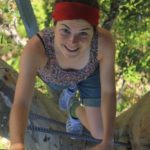 Jen is a Chancellor’s Fellow in Energy at the University of Strathclyde. Her research is interdisciplinary and applied, and addresses the social and environmental risk of geological resources – often relating to energy. Jen uses her technical background in geology to tackle questions relevant across geoscience, environmental science, environmental psychology, environmental engineering and political science. These questions relate to the perception, assessment and communication of risks relating to low-carbon energy technologies, which, for many, the subsurface plays a vital role. Ultimately her work aims to inform how the necessary transition to a net zero carbon future can be implemented in a way that is acceptable to society and to the environment. Jen took part in the ReSToRE Summer School as a reporter.
Jen is a Chancellor’s Fellow in Energy at the University of Strathclyde. Her research is interdisciplinary and applied, and addresses the social and environmental risk of geological resources – often relating to energy. Jen uses her technical background in geology to tackle questions relevant across geoscience, environmental science, environmental psychology, environmental engineering and political science. These questions relate to the perception, assessment and communication of risks relating to low-carbon energy technologies, which, for many, the subsurface plays a vital role. Ultimately her work aims to inform how the necessary transition to a net zero carbon future can be implemented in a way that is acceptable to society and to the environment. Jen took part in the ReSToRE Summer School as a reporter.

